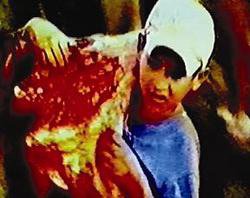Radical Shift
dal 12/3/2011 al 21/5/2011
Segnalato da
Oscar Bony
Nicola Costantino
León Ferrari
Gabriela Golder
Norberto Gomez
Víctor Grippo
Alberto Heredia
Guillermo Kuitca
Jorge Macchi
Fabián Marcaccio
Charly Nijensohn
Cristina Piffer
Juan Carlos Romero
Graciela Sacco
12/3/2011
Radical Shift
Museum Morsbroich, Leverkusen
Political and Social Upheaval in Argentinean Art since the 1960s. The exhibition ranges from the politically-motivated, conceptual art of the 1960s and the 1970s via the immediate engagement with the period of dictatorship, all the way to the work of both successive generations that, for their part, relate to reality in highly distinctive ways. Works by Oscar Bony, Nicola Costantino, Leon Ferrari, Gabriela Golder, Norberto Gomez, Victor Grippo, Guillermo Kuitca, Jorge Macchi, Fabian Marcaccio...

A period of radical upheaval took place in Argentinean art during the late 1960s and the early 1970s. This shift wasn't solely articulated in formal experiments. It was motivated above all by the renunciation of institutionalised contexts and concomitant espousal of a more committed form of art critical of the media, which in turn brought forth political actions and public interventions. This art engendered an active distancing from the ruling authorities, who were stealthily launching an insidious process of censorship, repression and marginalisation. This process culminated in a brutal military regime that seized the reins of power and ruled for more than half a decade.
These experiences, coupled with an undaunted quest for a national identity, still characterise contemporary art in Argentina today. In more recent times, the economic crisis in 2001 still marks a trenchant watershed, which once more transformed social conditions on a massive scale. Artworks focusing thematically upon that socio-political upheaval and exposing those processes operating 'subcutaneously' occupy centre stage in the exhibition. Indeed, these dual narrative strands are frequently present in one and the same artwork.
The exhibition ranges from the politically-motivated, conceptual art of the 1960s and the 1970s via the immediate engagement with the period of dictatorship, all the way to the work of both successive generations that, for their part, relate to reality in highly distinctive ways. If four decades ago, direct engagement with the political events predominated as an artistic approach, questions of identity combined with existential human experience emerge as the salient themes today—viz. isolation, loneliness, disappearance and loss. Violence, be it of a psychological, repressive nature or treated within the specific historical context, plays a central role in practically all the works.
The focused approach towards contemporary art in Argentina, based upon outstanding artistic positions featured here, reflects art's sustained relevance and power to create identity to this day. The fact that only a few years ago, a retrospective exhibition on León Ferrari—one of the protagonists of the art scene—became an object of legal proceedings, clearly demonstrates the abiding volatility of contemporary Argentinian art.
With works by Oscar Bony (1941–2002), Nicola Costantino (b.1964), León Ferrari (b.1920), Gabriela Golder (b.1971), Norberto Gómez (b.1941), Víctor Grippo (1936–2002), Alberto Heredia (1924–2000), Guillermo Kuitca (b.1961), Jorge Macchi (b.1963), Fabián Marcaccio (b.1963), Charly Nijensohn (b.1966), Cristina Piffer (b.1953), Juan Carlos Romero (b.1931) and Graciela Sacco (b.1956)
A catalogue will be published by the Verlag für moderne Kunst Nürnberg with numerous images, academic essays by Claudia Gilman, Andrea Giunta and Heike van den Valentyn, as well as short monographical texts on each artist written by renowned Argentinian art historians and curators. A chronology, manifestos, artist biographies and a bibliography will provide further information on the development of Argentinean art since the 1960s (240 pages, approx. 150 colour illustrations).
Image: Gabriela Golder, Vacas / Kühe, 2002
Videoinstallation
Maße variabel
Courtesy die Künstlerin
Opening Sunday, 13 March 2011, noon
Museum Morsbroich
Gustav-Heinemann-Strasse 80, 51377 Leverkusen



